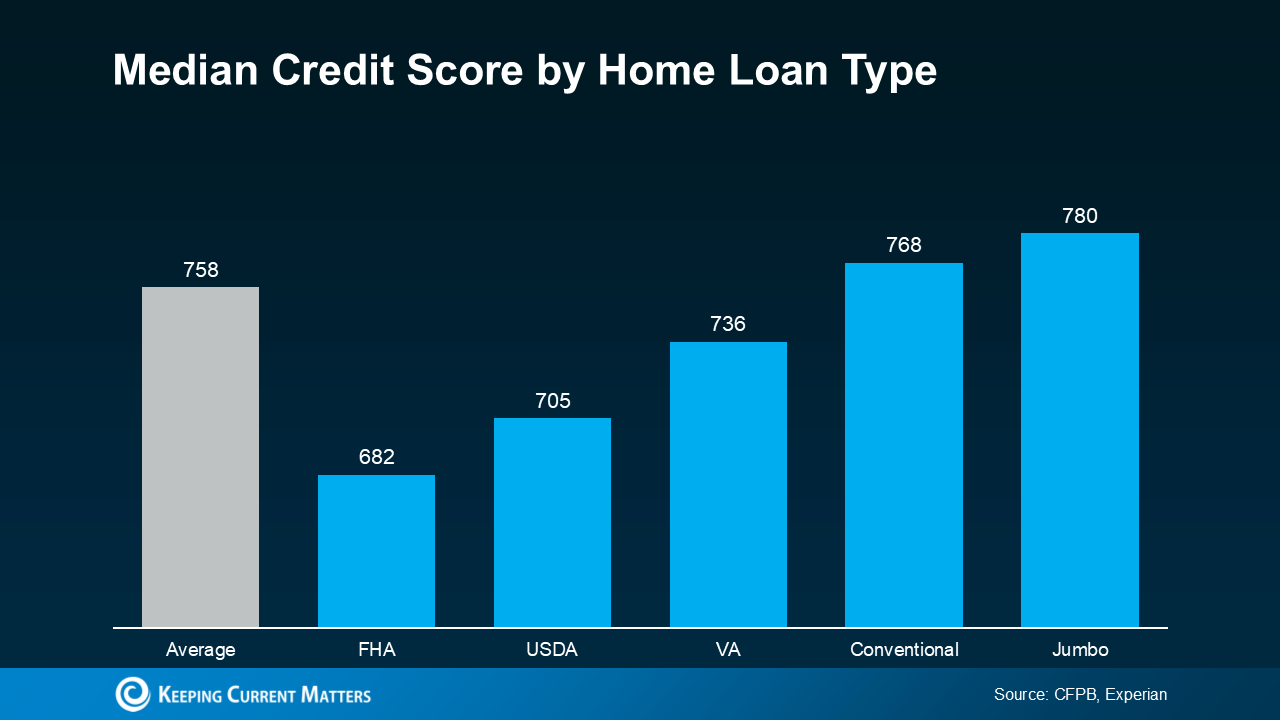According to Fannie Mae, 90% of buyers don’t actually know what credit score lenders are looking for, or they overestimate the minimum needed.
Let that sink in. That means most homebuyers think they need better credit than they really do – and maybe you’re one of them. That misconception could make you believe buying a home is out of reach right now, even if that’s not necessarily the case. So, let’s look at what the data really says about credit scores and homebuying.
There’s No One Magic Number
There isn’t a universal credit score you absolutely must have to buy a home. That means there’s more flexibility than most people realize. Check out this graph showing the median credit scores recent buyers had for different home loan types:
📊 a graph of a credit score
Here’s the key takeaway: the numbers vary, and there’s no one-size-fits-all threshold. That could open doors you thought were closed. The best way to learn more is to talk to a trusted lender. As FICO explains:
“While many lenders use credit scores like FICO Scores to help them make lending decisions, each lender has its own strategy, including the level of risk it finds acceptable. There is no single ‘cutoff score’ used by all lenders, and there are many additional factors that lenders may use . . .”
Why Your Score Still Matters
When you buy a home, lenders use your credit score to gauge how reliable you are with money. They want to know if you make payments on time, pay back debts, and handle your finances responsibly.
Your score can influence which loan types you qualify for, the terms of those loans, and even your mortgage rate. And since your mortgage rate plays a big role in how much house you can afford, your score feels even more important today. As Bankrate says:
“Your credit score is one of the most important factors lenders consider when you apply for a mortgage. Not just to qualify for the loan itself, but for the conditions: Typically, the higher your score, the lower the interest rates and better terms you’ll qualify for.”
That doesn’t mean your credit has to be perfect. Even if your score isn’t where you’d like it to be, you may still be able to qualify for a mortgage.
Want To Boost Your Score? Start Here
If you talk to a lender and decide you want to improve your score (and hopefully your loan options too), here are a few smart moves according to the Federal Reserve Board:
-
Pay Your Bills on Time: This is huge. From credit cards to utilities and cell phone bills, consistent on-time payments show lenders you’re dependable.
-
Pay Down Your Debt: The less of your available credit you’re using, the better. Keeping this ratio low signals to lenders that you’re a lower-risk borrower.
-
Review Your Credit Report: Get copies of your report and dispute any errors. Correcting mistakes can give your score a boost.
-
Don’t Open New Accounts: Opening multiple new credit cards may seem helpful, but it can backfire. Too many new applications lead to hard inquiries, which can temporarily lower your score.
Bottom Line
Your credit score doesn’t have to be perfect to qualify for a home loan. But improving it can help you secure better terms. The best way to know where you stand and explore your mortgage options is to connect with a trusted lender.


 Facebook
Facebook
 X
X
 Pinterest
Pinterest
 Copy Link
Copy Link

